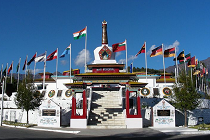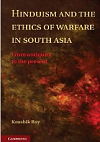The classified Henderson Brooks report on the India-China War is still relevant for India, considering China's renewed aggression at the Line of Actual Control. The findings highlight the need to re-think our muddled China policy and coordination among the political, bureaucratic and military establishments.
The Nuclear Security Summit was first held in 2010 with the goal of raising awareness about the need to tighten control of nuclear material. The agenda of the Nuclear Security Summit in 2014 is to work towards the establishment of tight controls over nuclear materials, seek greater transparency on national measures to enhance nuclear security, ask more countries to join international agreements on the physical protection of nuclear material, reduce the use of highly enriched uranium (HEU) and plutonium in national nuclear programmes and strengthen the International Atomic Energy Agency (IAEA).
 Courtesy: Rajkumar1220/Wikimedia Commons
Courtesy: Rajkumar1220/Wikimedia Commons
The classified Henderson Brooks report on the India-China War is still relevant for India, considering China’s renewed aggression at the Line of Actual Control. The findings highlight the need to re-think our muddled China policy and coordination among the political, bureaucratic and military establishments
Amidst all the talk about the missing Malaysian Airlines MH370 flight being hijacked for a possible September 11-style attack on an Indian city, it is necessary to look at the state of our security preparedness and whether India has adequate air defences to deal with such an aerial attack. Sameer Patil, Associate National Security Fellow, Gateway House, explains.
 Courtesy: Aero Icarus/Wikimedia Commons
Courtesy: Aero Icarus/Wikimedia Commons
The talk about the missing Malaysian airlines being hijacked for an attack on an Indian city has necessitated an assessment of India’s counter-terrorism preparedness. India has strengthened its air defences on the tactical front but lags behind in intelligence sharing in aerial, land and maritime terror attacks
On March 2, a group of attackers burst into a railway station in the south-west city of Kunming and began stabbing people at random. Sameer Patil, Associate National Security Fellow, analyses and comments on the situation.
China recently announced its budget for 2014-2015, with US$132 billion allocated to military expenditure, an increase of about 12% since the previous year. Sameer Patil, Associate National Security Fellow, Gateway House, highlights and analyses the important components.
 Courtesy: Cambridge University Press
Courtesy: Cambridge University Press
In ‘Hinduism and the Ethics of Warfare in South Asia’, Kaushik Roy counters West-centric arguments that India has traditionally lacked strategic culture and thinking
 Courtesy: Eugenio/Wikimedia Commons
Courtesy: Eugenio/Wikimedia Commons
A string of tragic accidents, an ageing fleet of sub-marines and a lack of vision are hampering the Indian Navy’s growth as a regional force. The new government will have to rethink the system of defence purchases and invest in indigenisation to optimise the strength of the Indian armed forces







